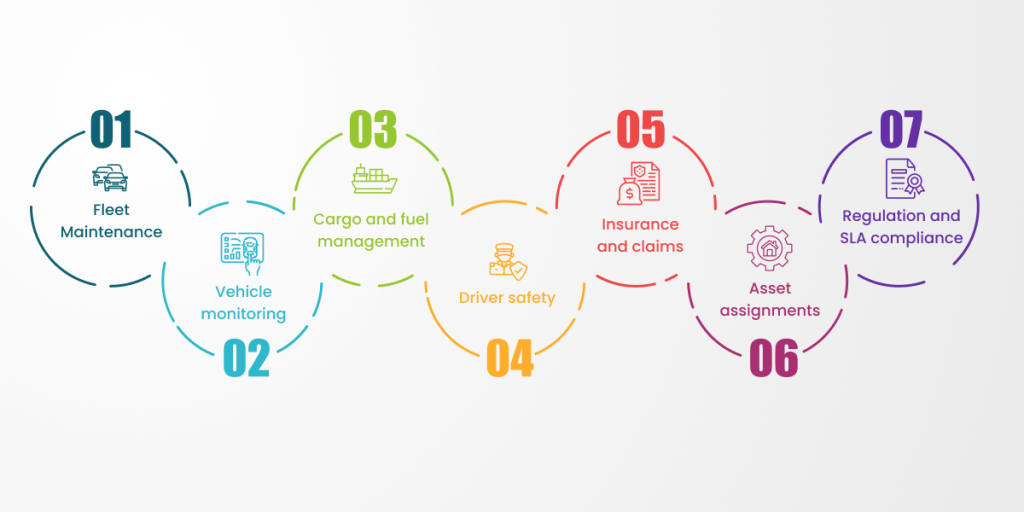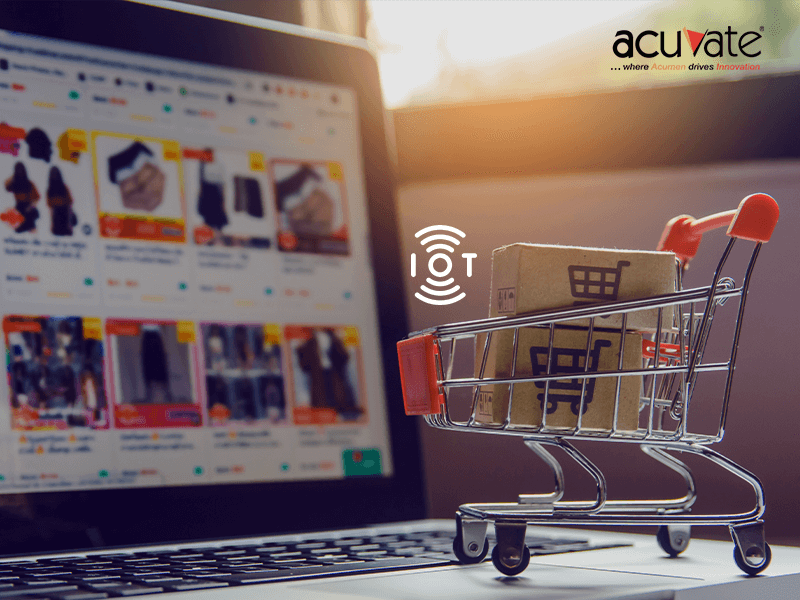Efficient operations and supply chains are at the heart of modern businesses. To meet the sensitive and mission-critical demands of this sector, the industry, and customers, fleet companies invest significant resources, time, and money to keep up with safety standards, manage fleet assets competently, and maintain favorable performance levels. IoT-based fleet and equipment management solution can elevate these processes and optimize related expenses.
An enormous amount of data, ranging from fuel consumption levels, frequency of maintenance cycles, and codes for engine diagnostics to the near real-time vehicle location, delivery ETAs, in-vehicle passenger toll, and driver performance, needs to be collected and analyzed for ideal fleet management.
But fleet managers often find themselves consumed by inefficient, repetitive, or manual tasks that rarely achieve business objectives. If these crucial tasks are not handled efficiently, they can soon snowball into redundant expenses.
Some of the most significant fleet management challenges include:
- Fluctuating fuel and vehicle maintenance costs, causing inconsistent and unpredictable expenses
- Lack of holistic insights into fleet operations, performance, and driver safety, among other critical parameters, causing inefficient, unsafe, and insight-less operations
- Manual follow-ups with drivers, leading to slowed-down business processes and increased demand for human intervention in repetitive, automatable tasks
- Difficulty in providing accurate ETAs, fuel consumption, and route status to relevant stakeholders like customers and other team members, leading to dissatisfaction and lack of clarity
- Inadequate asset utilization and lack of seamless fleet management
- Data silos due to unintegrated fleet data with other operational insights
These challenges span industries like telecom, logistics, public sector & SLG, healthcare, ecommerce, supply chain, manufacturing, oil & gas, energy, and utilities. It is important to note that these are mission-critical sectors impacting life, consumer demand, and citizen experience.
How IoT addresses fleet management challenges
In recent years, IoT, connected devices and equipment, and large-scale sensorization have significantly facilitated real-time, insight-led, and cost-effective decisions for logistics operators, fleet managers, and drivers.
IoT-based fleet and equipment management solution leverage sensors and connectivity to make seamless machine-to-machine (M2M) and human-to-machine (H2M) communication possible, allowing new data collection and analytics avenues. Ultimately, this powers robust preventive and prescriptive business decisions.
IoT telematics solutions help gather, store, and assess vehicle and route status data from AI-based technologies and connected GPS tracking devices for on-time diagnostics. Such data helps fleet managers and owners better check driver activity and safety and vehicle and asset management.
Uploading the collected data to the cloud and giving it an accessible platform enhances the feasibility and manageability of operations. In addition, IoT-run devices equipped with in-built processor capabilities pave the way for establishing a connection between the fleet owner and manager, the cloud, the vehicle, and the driver.
The crucial outcomes of IoT-based fleet and equipment management solution
IoT has helped increase sustainability across environmental and business considerations, visibility into cargo vehicles, and their seamless management. New-age IoT-run fleet and equipment management solution offers several advantages to fleet owners, managers, drivers, passengers, and insurers.
Let’s look at some of the benefits that businesses gain from the use of IoT-based best vehicle management solutions:
- IoT-based fleet and equipment management solution help safeguard the fleet and enhance the vehicles' overall competency.
- IoT fleet maintenance solution can help accomplish efficient fuel consumption levels and maintain good engine health.
- The system also helps monitor the overall condition of each vehicle in the fleet.
- All fleet activities can be kept under check through real-time location tracking.
- The fleet maintenance solution system increases the visibility of vehicles through data collection, analysis, and tracking.
- IoT-based fleet and equipment management solution solutions help increase security by installing sensors and cameras across the vessel.
- In case of contingencies like a crash or engine failure, IoT-enabled hardware installed with the engine's module immediately sends distress signals and information over to the control center for help.
IoT-based fleet management solution: Top use cases

The colossal potential of IoT in higher visibility across fleet operations has led to a significant rise in its awareness and usage among fleet managers.
This leading-edge innovation has helped the fleet management industry achieve staggering market value. Studies show that where the global IoT-backed fleet management solutions revenue was mere $3,250 million in 2017, the expected revenue is set to reach a whopping $15,500 million by the year-end of 2024.
Fleet managers and organizations across the globe have been adopting the best vehicle maintenance solution for fleet management, given the magnitude of growth IoT brings.
Let’s see how it is impacting business processes.
1. IoT-based fleet management use case: Fleet maintenance
The in-built processor capabilities of IoT-enabled devices help detect and act on prevalent issues with a fleet vehicle. In addition, the collected data can be processed and evaluated to create a barrier for future difficulties that may cause operational hindrances and inconsistencies.
To learn more about how IoT is optimizing the logistics business and improving fleet operations, read IoT Optimizes Your Logistics Business.
2. IoT-based fleet management use case: Vehicle monitoring
Fleet managers can comprehensively check the vehicle environment with cameras, image processing, and built-in sensor devices. IoT-based fleet management system delivers real-time updates of vehicles, pedestrians, and nearby objects. It also indicates battery life and sets maintenance alerts to safeguard drivers against accidents.
3. IoT-based fleet management use case: Cargo and fuel management
IoT-run processors check the security and state of cargo during transit. By helping regulate temperature, IoT helps preserve perishable goods such as medicines and food. It is also helpful in preventing theft and pilferage, as the cargo is continuously monitored. Lastly, vibration sensors ensure any fragile freight in the vehicle reaches its destination in good condition.
Consistent insight into fuel status, usage, and trends ensures zero-pilferage and optimized consumption. Ultimately, this adds to the bottom lines while making fleets more environment-friendly.
4. IoT-based fleet management use case: Driver safety
Cutting-edge technologies like backup cameras and blind-spot detectors warn drivers against mishaps and provide assistance whenever required. The recorded video data can be stored for future use in workflows like driver training. Cameras installed inside the cabin allow managers to oversee driver behavior and avoid drunken or rash driving.
5. IoT-based fleet management use case: Insurance and claims
Insurance companies also benefit from IoT-based telematics data. For example, data collected from telematics help them develop extensive summaries for their underwriters. It ensures rightful claims are processed in time to help their businesses recover accident costs.
6. IoT-based fleet management use case: Asset assignments
Real-time data on fleet status, schedules, and location help operators manage vehicle assignments seamlessly. As a result, fewer conflicts and quick assignments improve operational efficiency.
To explore more about how IoT can improve asset management in your fleet, read IoT Asset Management Solution Benefits.
7. IoT-based fleet management use case: Regulation and SLA compliance
Fleets work closely with other industries like food & beverage, healthcare, pharmaceuticals, ecommerce, and more. These sectors must comply with dynamic and strict government regulations and sky-high customer demands.
Compliance with such rules is easier with IoT. For example, IoT-based fleet management solution can help operators remotely control temperature and preserve weather-sensitive drugs or food items. Shipments can also be monitored so deliveries are made within specified SLAs, delays can be prevented, or customers can be kept updated.
Discover practical examples of how IoT is transforming the logistics industry with innovative solutions by reading our IoT Logistics Use Cases.
Acuvate’s IoT-based Fleet Management Solution: Years ahead of the pack
Whether you are looking to score the best vehicle maintenance solution or a complete fleet and equipment management solution, Acuvate makes it all better with fleet, maintenance, route & safety management capabilities.
With Acuvate’s intelligent fleet maintenance and management solutions, you achieve:
- Real-time fleet data collection and consolidation for visibility and analytics
- ETA prediction and breakdown alerts
- Seamless asset insurance premium tracking and renewal reminders
- Reduced downtime and repair costs with continuous real-time monitoring and preventive and prescription action
- Scheduled maintenance for the fleet with vehicle maintenance checklist
- Consistently updated maintenance logs
- Driver performance tracking, alerts on cautionary activities like lane shifting, rash driving, harsh braking, seatbelt status, drunk driving, drowsiness, etc.
- Cargo safety monitoring to ensure satisfactory customer deliveries
- Insight into the actual cost of fleet maintenance with trends and predictions for optimal and predictable expenses
- Real-time location insights for assets and vehicles with relevant alerts by syncing geolocation and odometer data through ECUs and OBD-II
- Service planning, implementation, tracking and visibility into costs
- Real-time fuel consumption data through OBD-II for optimal and environmentally sustainable usage and pilferage prevention
- Optimal route monitoring and suggestions to avoid traffic and adverse weather conditions to meet ETA predictions
- Enterprise-level safety and security of fleet, cargo, drivers and frontline workers
Acuvate’s innovative fleet and equipment management solution system provides regular alerts and notifications to fleet managers, warehouse workers, and drivers regarding delays, eventualities, and other mission-critical information.
Acuvate’s connected fleet management : A case study
An Acuvate customer provides fleet service operations and manages the scheduling, maintenance, and operations of over 500 vehicles daily.
The challenge: Drivers were not meeting ETAs. Cargo was frequently damaged, and vehicles were often used even when they were long overdue for maintenance.
The customer required a holistic fleet, equipment, and vehicle management workflow that could predict ETA and improve customer satisfaction indices. The company also needed to ensure enhanced safety of cargo and assured damage prevention, tracking driver performance and acting on negligence promptly. Vehicle health and maintenance were also a top priority.
The solution: Acuvate put its product mindset to work to build the best fleet and equipment management solution for the customer with iDataware on Azure. The solution included fleet mapping services so the client could receive real-time location updates and predict the most accurate delivery ETA.
The solution integrated ECU level sensors, brake actuators, wheel speed sensors, fuel level indicators, and torque level sensors, among several other data sources, onto the Azure IoT Hub, delivering real-time alerts and updates about each vehicle and driver in the fleet.
The business outcomes:
- 70% increase in accurate ETA predictions
- Regular monitoring of driver performance brought rash driving down to 8% from 20%, resulting in minimal to no damage to cargo and improved driver and vehicle safety
- All relevant data regarding route status, weather reports, among others, was integrated into one platform, making analytics and insights more accessible and actionable
- Automation ensured real-time updates and alerts, vastly improving operational and workforce efficiency
Bottomline: Improve fleet efficiency with IoT interventions
IoT-based fleet management is the future of the industrial sector as well as consumer-facing businesses. Acuvate, with its seasoned experts and potent tech infrastructure partners like Microsoft, is leading the adoption of contemporary technologies like camera vision, AI & ML, and IoT to deliver market-ready solutions for improved fleet management and maintenance.
Ultimately, our goal is to ensure sustainable fleet operations, both revenue-wise and environmentally. In addition, ensuring driver safety will help fleet operators confidently manage their fleets and businesses and stay future-ready.
Ready to achieve these benefits for your fleet? Talk to an Acuvate IoT expert today.



